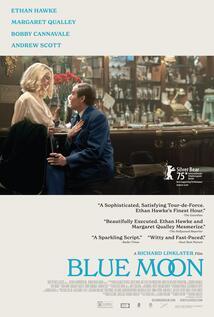

Richard Linklater is an odd choice as director, and his frequent collaborator, Ethan Hawke, is a strange choice as star for this theatrical, meditative, melancholy comedy about the great songwriter Lorenz Hart. Still, they craft a handsome character study with a fascinating performance at its center. The movie takes place on the opening night of Oklahoma!, the smash-hit Broadway musical that transformed the American musical landscape. Oklahoma! is written by Hart's former creative partner, the composer Richard Rodgers, who has recently teamed up with a new lyricist—one without Hart's many personal and professional issues: Oscar Hammerstein II, whom Hart considers a pedestrian lyricist. The film unfolds like a stage show, with Hart holding court in Sardi's restaurant on the night that Oklahoma! debuts to rapturous reviews.
The original screenplay by Robert Kaplow was inspired by the written correspondence of Hart and Elizabeth Weiland, a sharp and enchantingly beautiful college student whom Hart took as a "protege." Weiland is played by contemporary It-girl, Margaret Qualley—there could be no more perfect casting in 2025. Key sequences in the film center on Hart and Weiland engaged in private conversation while everyone else celebrates Rogers and Hammerstein. However, even more screen time is devoted to Hart talking with the bartender (Bobby Cannavale), the piano player (Jonah Lees), fellow Sardi's patron E. B. White (Patrick Kennedy), and Rodgers (Andrew Scott). The film involves so many two-hander scenes and outright monologues that it feels as if this were adapted from a play rather than written directly for the screen. Even the set, with its staircase leading up to a room we never see, feels made for the stage. This is not a criticism; movies that have the patience to stay with a small handful of characters in a single set are more than welcome in today's noisy cinematic era.
Kaplow was inspired to write the film after reading letters Weiland supposedly sent to Hart that he purchased from a bookseller many years ago. Blue Moon is Kaplow's first produced feature screenplay, but his novel Me and Orson Welles—a coming-of-age story that also tells an imagined tale involving real-life characters mingling with fictional ones set in the New York theater world only a few years before this one—was adapted into a movie directed by Richard Linklater. (I don't mind telling you that this little-seen, brief-encounter picture starring Zac Efron, Claire Danes, and Christian McKay as Welles, is my favorite Linklater movie).
I love films where hyper-verbal, self-loathing characters pontificate about art and critique everything around them, almost as much as I love romantic, brief-encounter pictures. And Blue Moon is as fine an example of the former as Me and Orson Welles is of the latter. The slim, sexy, ultra-confident, five-foot-ten Hawke may be totally inappropriate casting for this role (boy, do I know a lot of short, insecure actors who are going to hate this picture, but we all know heightism is the last acceptable prejudice in our culture and one that is impervious to woke casting requirements). No matter; Hawke is terrific in the film. He transforms himself the old-fashioned way, without any prosthetics or complex make-up. Just thinning his hair, shaving his signature goatee, and carrying himself like a man who is uncomfortable in his own skin. I love watching a good actor "stretch" like this (Hart would appreciate that pun, I think). It is, however, distracting every time Linklater cuts to a wide shot of Hart in which some trickery has been employed to make Hawke appear short—trickery that seems to require that the actor never move from the spot he's planted in.
Kaplow's dialogue crackles with wit, wordplay, some great dick jokes, and genuinely profound sentiments about unrequited love and the intellectual and emotional varieties of unbridled adoration. Too bad he felt the need to fill the movie with overt Easter Eggs; the kinds of story beats and lines of dialogue that seem like they're only there to give a dopamine hit to anyone remotely familiar with these iconic cultural figures. It's great to have E. B. White appear as a character to interact with at Sardi's, but do we also have to have George Roy Hill, Weegee, and young Stephen Sondheim as well? (And must we witness the origin story of Stuart Little?) These missteps would critically damage a lesser film, but here they feel much like those distracting wide shots. I wish the filmmakers had made different choices, because I think they hinder the movie rather than enhance it, but these are ultimately minor quibbles.
Far less clumsy is the delightful way songs, both those by Rogers and Hart and by their contemporaries, are woven through the movie. Snippets of tunes, occasionally sung but most often played in the background by the character of the Sardi's piano player (an enlisted man on leave from his unit), underscore each of Hart's conversations and rants in subtle, clever ways. Just hearing instrumental versions of these songs transports you back to the time this story takes place, far better than any production designer or cinematographer could. Whenever I hear someone playing these American standards, I curse my parents for not forcing me to take piano lessons. How wonderful it would be to be able to express one's feelings, especially those of romantic joy, longing, regret, and adoration, whenever one felt them (provided there was a piano handy). Now imagine you could write all those songs, yet that ability just isn't enough. That's what this bewitching little movie captures.
Twitter Capsule:
A captivating, theatrical, meditative, melancholy comedy about the great songwriter Lorenz Hart, brought lovingly to the screen by the unexpected (for this material) duo of Richard Linklater and Ethan Hawke.




